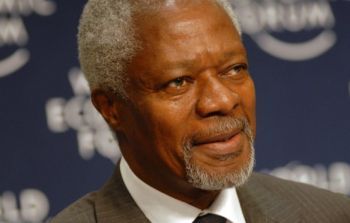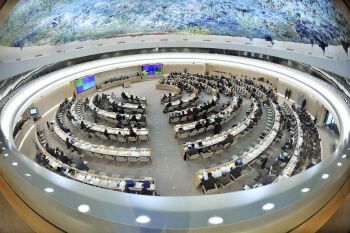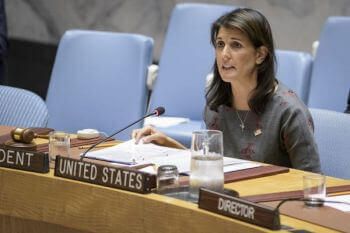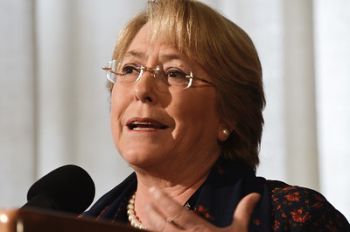To understand the toxic relationship between the UN Human Rights Council and Israel, one must look to the council’s predecessor, the UN Human Rights Commission.
A moment of candor by Secretary General Kofi Annan sums up the problem then and now.
The (Human Rights) Commission’s capacity to perform its tasks has been increasingly undermined by its declining credibility and professionalism. In particular, States have sought membership of the Commission not to strengthen human rights but to protect themselves against criticism or to criticize others. As a result, a credibility deficit has developed, which casts a shadow on the reputation of the United Nations system as a whole.
It says a lot about a department inside an organization when the CEO not only criticizes a part of his own empire, but publicly discredits its work and the people who run it.

That’s exactly what happened when Annan dropped a bombshell back in 2005 when he declared that countries had sought membership in the UN Commission on Human Rights “not to strengthen human rights but to protect themselves against criticism or to criticize others.”
An embarrassed UN saw that the commission had too many countries with miserable human rights records. Annan called for its replacement with a new special body, the UN Human Rights Council. The UNHRC was formed a year later, but it was no surprise at all that it was quickly plagued by the very same problems as its predecessor.
Since its creation in 2006 the “widely-criticized” UN Human Rights Council has been regularly panned in the mainstream press. The New York Times labeled it “the discredited Human Rights Council” as it simply continued in the path of the defunct commission. After only two years Annan’s successor at the helm of the UN, Ban ki-Moon, was forced to call on the UNHRC to “rise above partisan posturing and regional divides.”
Join the fight for Israel’s fair coverage in the news
The UN Human Rights Council’s Dubious Members
The UNHRC never rose above its mess, and so the organization responsible for ensuring countries adhere to international human rights standards is instead stained by very the company it keeps.
The UN Human Rights Council has 47 member countries elected from different regions by the UN General Assembly for three-year terms. With the UN having been described as a “clubhouse for a rising new axis of dictators,” the countries that voted in members to the old commission were not prevented from continuing to vote for putting repressive regimes on the new UNHRC.

In its 2017 report, the UNHRC admitted that nine of its members at the time (Burundi, Egypt, Rwanda, Cuba, Venezuela, China, India, Saudi Arabia and the United Arab Emirates) were accused of retaliating against their very own citizens who reported human rights abuses to the UN.
The state of affairs rose to the level of absurd in 2019 when international human rights organizations called on the UN General Assembly to block Venezuela from re-joining the Human Rights Council (it had twice before served on the council).
The council’s “voice is weakened when the likes of Venezuela are allowed to join,” said Kenneth Roth, the director of Human Rights Watch. “That some other abusive governments already sit on the council is no reason to make matters worse by adding Venezuela,” whose government “is responsible for a vicious crackdown on dissent.”
However, the General Assembly approved Venezuela’s accession to the council in what the Washington Post called “a controversial victory for a regime accused of using intimidation, torture and murder to cling to power.”
Related reading: Israel and the UN – A Good Relationship that Turned Toxic
A Permanent Obsession With Israel
One of the damning features of the UN Human Rights Council is its permanent obsession with Israel, where the pro-Palestinian lobby has succeeded in making Israel the only country to appear as a permanent item on the council’s agenda. This means that every council session is obliged to review alleged Israeli abuses. Under the universal periodic review that governs everyone else, countries’s human rights records are only examined once every five years. The systematic singling out of Israel by the council is seen by many countries as one of the key flaws that show its biased ineffectiveness.
“No other country in the world is subjected to a stand-alone focus that is engraved on the body’s permanent agenda, ensuring its prominence, and the notoriety of its target, at every council meeting,” said Hillel Neuer, director of UN Watch. Neuer’s independent watchdog group reported that in its first ten years, 68 of the 135 resolutions passed by the UNHRC were exclusively targeted against Israel.
French human rights minister Rama Yade said the body persisted in passing “unbalanced resolutions” on the Middle East with its fixation on resolutions condemning only Israel.

In 2018 the United States gave up trying to get the dysfunctional body to actually concentrate on human rights and announced it was pulling out of the council. US Ambassador to the UN Nikky Haley called the UNHRC the United Nation’s “greatest failure” and condemned it as a “cesspool of political bias.”
“Look at the council membership and you see an appalling disrespect for the most basic human rights,” Haley said.
“Human rights abusers continue to serve on and be elected to the council. The world’s most inhumane regimes continue to escape scrutiny, and the council continues politicizing and scapegoating of countries with positive human rights records in an attempt to distract from the abusers in their ranks,” Haley explained. “The council ceases to be worthy of its name. Such a council, in fact, damages the cause of human rights.”
After listing the UNHRC’s failures at protecting human rights around the world, Haley noted the “disproportionate focus and unending hostility towards Israel is clear proof that the council is motivated by political bias, not by human rights.”
Related reading: The UNRWA Refugee Controversy Explained
A Blacklist and Black Eye
One of the most egregious abuses of the council was the move to create an anti-Israel “blacklist” – a “database of all business enterprises engaged in certain Israeli settlement activity.” As with many other anti-Israel actions by the UN Human Rights Council, Israel will be the first and only country to have such a database, which pro-Palestinian groups intend to use to advance their program of boycotting Israeli companies. The 2018 appointment of former Chilean president Michelle Bachelet as UN High Commissioner for Human Rights intensified the council’s blacklist push.

In a Washington Post op-ed, global trade attorney Doron Hindin highlighted the biased, undemocratic and arbitrary methods the blacklist would use:
Procedurally, companies would be added to the U.N. database without any form of due process. Listing criteria do not exist. Businesses would not be able to contest their inclusion before it was made public, and once designated, they would not have access to review or delisting mechanisms.
The move to produce the blacklist was one of the central reasons the US decided to distance itself from the UNHRC. It is known that Bachelet delayed the release of the blacklist, and that Secretary-General Antonio Guterres does not support it. But moves by the International Criminal Court to investigate alleged Israeli war crimes in the West Bank have reportedly emboldended Bachelet to again push forward with the blacklist.
Related reading: How the Palestinians Manipulate the International Criminal Court Against Israel
* * *
During a 2017 official visit to Israel, Guterres promised that he would work to show that under his watch the United Nations would act so “that equality in the treatment of all states is fully respected.”
With the bias of the UNHRC an acknowledged reality, Guterres appears to have a Sisyphean task on his hands.
Enjoyed reading this article? Follow the Israel In Focus page on Facebook to read more articles explaining Israel’s history, politics, and international affairs. Click here to learn more!
Featured image: vectors CC0 Pixabay; Annan via Wikimedia Commons; UNHRC meeting CC BY-NC-ND United Nations Photo; Haley via UN Photo/Manuel Elias; Bachelet CC BY-NC-ND UN Women;


